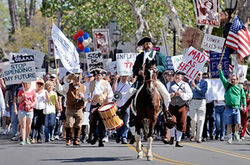UnNews:France recognizes American rebels
11 March 2011
ST. TROPEZ, France -- France has recognized the American rebel force, which is headquartered in Washington, D.C., as the legitimate government of the United States.
France thus becomes the first country to recognize the so-called Tea Party Patriots. The announcement comes as NATO is set to discuss military options in the conflict, including a possible no-fly zone over much of the Eastern Seaboard.
There is growing concern about the vicious attacks on rebel-held areas by the forces of President Barack Obama. In recent days, pro-government forces have tried to regain ground, bombarding the rebels with attractive offers to cut the current-year borrowing of the United States by 0.3%. But the rebels are standing firm and holding out for cutting the borrowing by a full 3%.
On Thursday, the office of President Nicolas Sarkozy said France regarded the Tea Party as America’s “legitimate representative", and considered “Ron Paul to be the President.” The announcement came one day after Euro-MPs urged the European Union to recognize the rebels. EU foreign affairs chief Baroness Ashton said she was not mandated to take such a step herself. A Tea Party envoy would have lobbied Europe for support, but the movement famously has no official leaders nor political positions.
The conflict in America has raged since last November, when the rebels took 63 seats in the House of Reprehensibles. Most of this furniture still has not been found, but the rebels are thought to be using the seats to replace the folding chairs they had used at various Elks Lodges during long meetings discussing one another's manifestos.
In the same public announcement, Sarkozy also recognized 16 rebel legislators in a seedy motel in Rockford, Illinois as the sole legitimate government of Wisconsin.
Sources[edit | edit source]
- Staff "France recognizes Libyan rebels" BBC News, March 10, 2011
